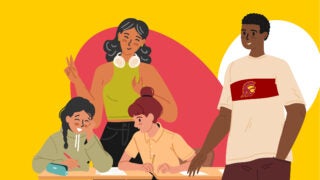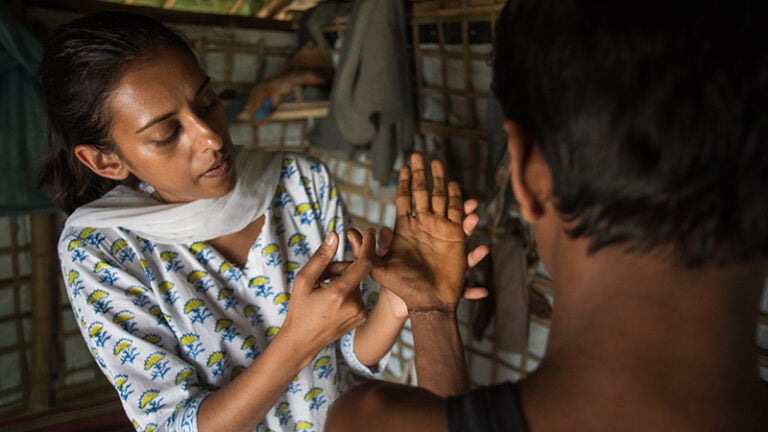
Physician Parveen Parmar studies health and human rights violations among refugees and displaced people. (Photo/Courtesy of Physicians for Human Rights)
Meet 4 Trojans Who Fight for the Health and Dignity of the World’s Most Vulnerable
They advocate for safety, human rights and well-being across the globe, and they’ll come back tomorrow to do it all over again.
He trudged through the emergency room doors. The man’s splitting headache stabbed him so deeply that it sent him to Los Angeles County+USC Medical Center. He waited to see a doctor, any doctor, in hope of relief.
Physician Parveen Parmar listened to him carefully and put him through a methodical battery of tests. Smile, she asked him — and he did. Could he squeeze her hands and then lift and lower his feet? Again, he did. She held her index finger up and moved it from side to side, then up and down, as she watched the man’s eyes. No sign of a serious condition, like bleeding in the brain, appeared.
None of the tests found anything.
But Parmar noticed something else: fear and sadness in her patient’s eyes. So, she tried another tack. Had anything, she asked, been bothering him lately?
That’s how she unearthed a source of pain no physician could cure.
The Healer: USC Doctor Practices Medicine of the Body and Soul
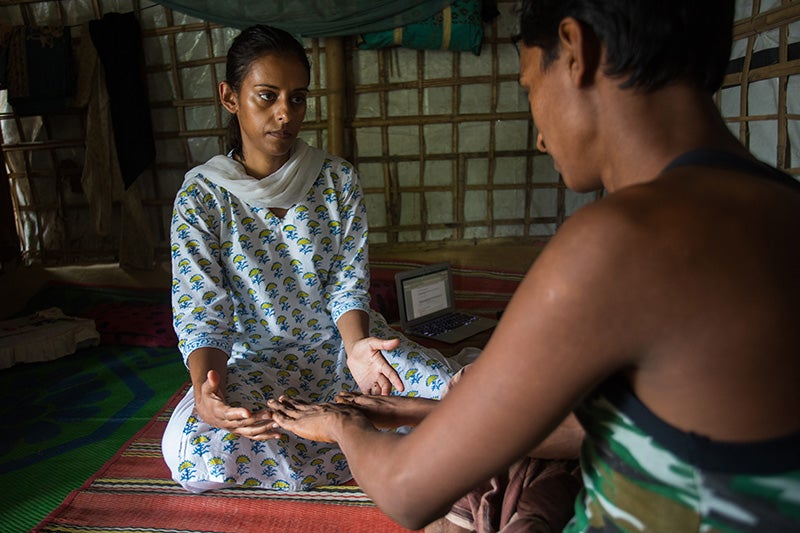
Parmar understands that the practice of medicine goes beyond running tests and studying symptoms. It’s about digging for stories that may otherwise go unspoken. She knows that because she has seen humanity at its best and its worst, whether in marginalized America or the Middle East. She is one of the members of the Trojan Family who have dedicated themselves to the crusade for human dignity.
An associate professor of clinical emergency medicine and chief of the Division of Global Emergency Medicine at the Keck School of Medicine of USC, Parmar has witnessed the powerful link between health and human rights countless times in areas of strife abroad. During her 20-year career, she has listened to Central African Republic refugees in Cameroon describe the sexual violence they suffered and provided her findings to health officials to guide support and resources. She investigated accusations of genocide against the Rohingya people in Myanmar and sent reports to the United Nations to strengthen criminal proceedings. She helped advise community health providers for Syrian refugees with diabetes and high blood pressure in Jordan.
She also advocates for health and human rights close to home in Los Angeles.
The traumas and tribulations of the city’s most vulnerable land on her doorstep in the LAC+USC emergency room. Every day brings a march of undocumented immigrants who fled crippling poverty and danger in their home countries in search of a better life. They are joined by people struggling with homelessness, substance abuse, mental health issues and violence. Although Parmar has seen the same problems for years, she remains as disturbed by them as she did as a young doctor — and in some ways, maybe more so. “Things are happening in the United States today that I never thought possible,” she says, referencing the treatment of asylum seekers and detained immigrants under the prior presidential administration.
Many of her patients bring troubles that are too hard for one doctor to solve, but she listens to them gently and does what she can.
The man who came to LAC+USC with a throbbing headache turned out to be an immigrant from Central America. He had recently spoken with family members back home who feared for their lives due to ongoing violence and civil unrest.
His pain came not from a damaged nerve or migraines, Parmar says. “He had the worst headache of his life because he was terrified of what was happening to his family.”
She prescribed headache medicine to ease his symptoms. But she also sat with him and listened to his story. She asked if he had friends or family who could support him and bring him comfort. And she referred him to a nearby clinic that offers help with stress and anxiety.
“Our population is so diverse and comes from so many places,” she says. “It’s a reminder that things that seem so far away are affecting our community in very real ways.”
For me, public health advocacy is an essential complement to practicing emergency medicine.
Parveen Parmar
Parmar’s work as an ER doctor can be hectic and tiring — she treats dozens of patients for eight hours straight each shift — so she is often asked why she gets involved in human rights advocacy. But she can’t separate the two, and her family is a big reason. Her Punjabi grandparents fled from newly formed Pakistan in 1947, and she grew up hearing their stories of persecution. Though her family managed to escape, it took them decades to build new lives in India.
Their experiences inspired Parmar to join letter-writing campaigns with Amnesty International by age 15. They drove her to become the first woman in her family to go to college, then the first female doctor. And her passion for advocacy still burns strong.
“For me, public health advocacy is an essential complement to practicing emergency medicine,” she says. “One requires the other. It is far too difficult to see the impact of social, economic and political factors on the health of our community without attempting to address the root causes.”
The Trailblazer: How a Major Health Crisis Galvanized a Human Rights Advocate
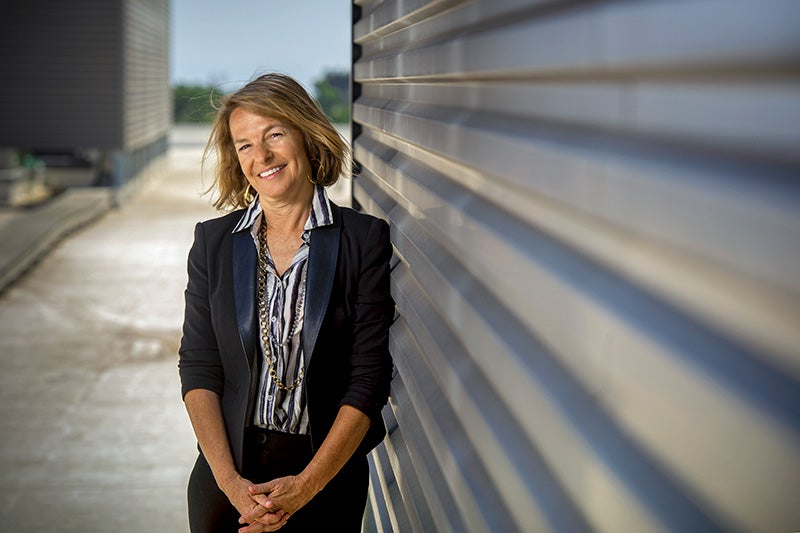
Sofia Gruskin left the University of California, Santa Cruz in the 1980s armed with a degree in ethnomethodology and an interest in human rights advocacy. She had little idea that an emerging epidemic — HIV/AIDS — would propel her into public health.
As she saw many of her friends and acquaintances in San Francisco and elsewhere fall ill, she also saw how laws directed toward them and their disease deepened their suffering. Fear and myths related to the virus spurred stigmas. Hospitals could block gay people from visiting their partner in the hospital, even in their last days, because they weren’t legally recognized as family members. People with HIV faced travel restrictions, some of which remain in place in other countries today.
Gruskin had found her calling in the fight for human rights within public health.
Now a professor of law and preventive medicine and director of the USC Institute on Inequalities in Global Health, she dedicates herself to bridging health and human rights through education, research, policy and advocacy.
Gruskin remembers how some governments used fear of AIDS as a reason to criminalize homosexuality and restrict the rights of other marginalized groups.
Antiviral cocktails eventually turned HIV into a more controllable, chronic infection, but issues remain. Gruskin remembers how some governments used fear of AIDS as a reason to criminalize homosexuality and restrict the rights of other marginalized groups. She believes similar misuse of law and policy is happening during the current pandemic. Some leaders around the world have used COVID-19 lockdowns as an opportunity to discriminate against LGBT populations or restrict access to family planning clinics, deeming them nonessential services. That has prevented millions of people from getting wellness exams, birth control, tests and treatment for sexually transmitted diseases, and other important health resources.
Even the good news of vaccines against the coronavirus comes with human rights implications that few have discussed or considered. The early days of COVID-19 vaccine distribution brought to light issues over fundamental rights. Wealthy countries snapped up vaccine supplies, leaving poorer nations behind. And when doses were first provided to health care workers, who decided what constitutes a health professional? “Does that mean only a physician or nurse?” Gruskin asks. “Or does it include the person working for minimum wage who is serving food at the hospital?”
But after more than three decades engaged in human rights advocacy, Gruskin remains an optimist. She’s convinced that if people recognize human rights abuses justified in the name of health, they’ll work to change them. “We need to raise awareness — not just about the problems, but what can be done.”
The Witness: Asylum Seekers Get Support from USC Doctor
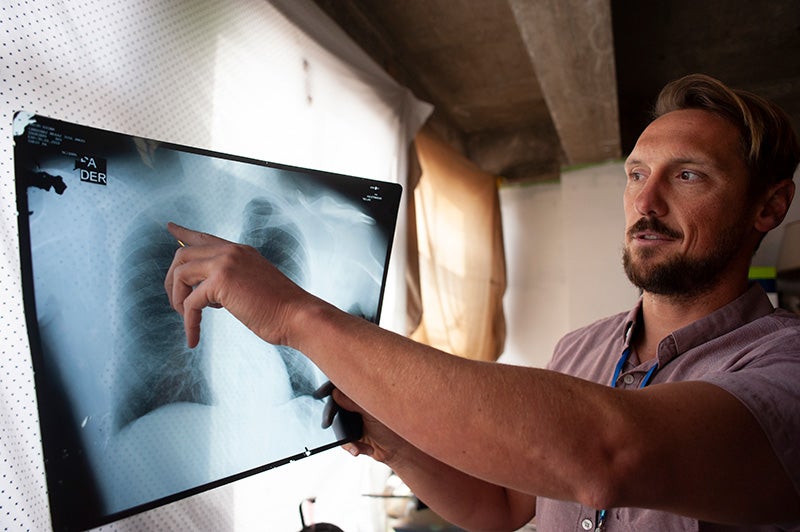
Every year, thousands of people flee violence and danger in search of a better life in the United States. To receive asylum, they must prove to a U.S. immigration official or judge that their safety — even their life — is at risk back home.
USC physician Todd Schneberk helps them make their case.
Working alongside medical students as faculty co-director of the student-run USC-Keck Human Rights Clinic, he examines and interviews asylum seekers to gather evidence they can use in their asylum applications. The findings are sobering. He records every scar from a bullet or stab wound and every symptom of stress, shock and psychological trauma in his notes. “They correlate with their story of being beaten, raped, tortured,” he says. “They provide credibility and increase the chances of the asylum case being taken seriously.”
Changes to the asylum system under the prior presidential administration require clients to wait in Mexico until their case is heard. The delay often means more psychological distress — and more danger, he says. Many wait indefinitely in Tijuana.
One family he met traveled north from Central America. The father had been a police officer who refused to take bribes, Schneberk says. Gang members shot at his house and threatened his relatives. The family fled to Mexico, where they await their asylum proceedings. Every day, the father travels three hours for work, leaving his wife and children alone.
“Strangers have tried to physically and sexually assault his wife while she takes care of her two kids,” Schneberk says. “I’ve talked to many families like this. It’s in direct violation of their human right, their international treaty-derived right to seek asylum. It’s a tragedy.”
He tries to focus on the positives, such as families that are granted asylum and his opportunity in 2019 to testify before Congress against dangerous asylum conditions. He knows the people he helps have a shot at a better life, and it gives him hope even as he documents the next human rights violation.
Being able to stand in solidarity with people and hear their stories and treat them with dignity is one of the most useful things we can do.
Todd Schneberk
The assistant professor of clinical emergency medicine at the Keck School of Medicine also draws inspiration from the medical students, nurses, doctors and other colleagues across USC who fight alongside him for health and human rights.
“Some of these access issues and inequalities are things we can’t necessarily reverse as just one person,” he says. “But being able to stand in solidarity with people and hear their stories and treat them with dignity is one of the most useful things we can do.”
The Partner: USC Doctor Shares Emergency Medicine Know-How
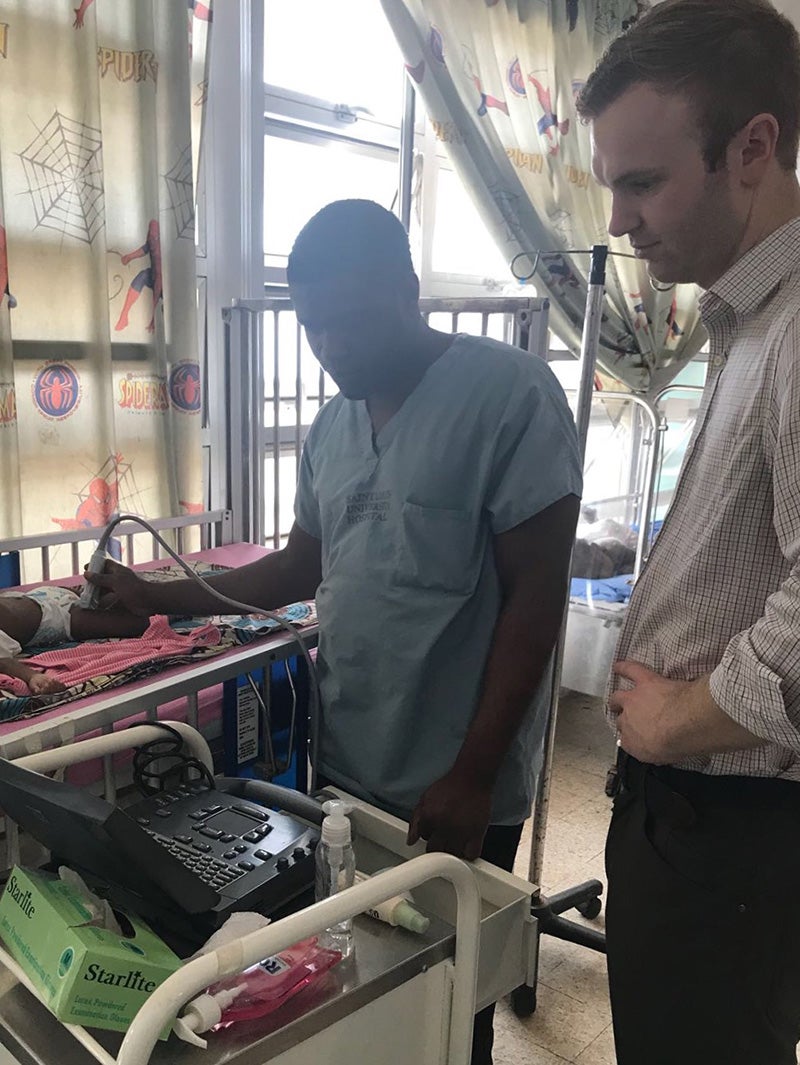
The ambulance raced through the streets of Nairobi, Kenya, its driver searching desperately for a hospital that would accept the badly injured man in its rear cabin.
Private health facilities turned away the paramedics, demanding a fee before they rendered aid. Officials at public hospitals insisted they had no open beds. After 18 frantic hours, a hospital finally admitted the 37-year-old man, who had been hit while crossing a busy road on his way to work. He fell into a coma and died days later.
Taylor Burkholder knows that tragedies like these are far too common. The USC physician has heard similar stories from colleagues around the world about people in need of immediate care who are turned away from hospitals. Some facilities require a deposit before accepting patients, forcing family members to scramble to come up with cash.
“As we know, the nature of an emergency is that it’s time-dependent,” says Burkholder, an assistant professor of clinical emergency medicine at the Keck School of Medicine. “Time matters. In the delay of that care to procure funds or find a hospital that will accept them, often outcomes are worse or people die.”
He hopes to help change that by sharing his knowledge of emergency medicine with health providers across the globe. Burkholder collaborates with the World Health Organization’s Emergency, Trauma and Acute Care program. He has helped with projects to strengthen emergency care in Haiti, South Africa and Liberia, among other nations. It’s a personal passion that grew from an unexpected meeting early in his career.
After training as an emergency medical technician, Burkholder had his sights set on medical school. Because of his work with a student-run ambulance service, he was tapped by the U.S. Department of State to meet with a delegation from Kazakhstan. They wanted to find out more about his experiences with the ambulance program.
“I had zero idea where Kazakhstan was or anything about global health,” he says. “But after that meeting, I realized you either could see one patient at a time in a clinical setting or you could do public health and global health work that might affect hundreds of thousands, if not millions, of people at a time.”
Burkholder earned a master’s in public health before completing medical school, and now he is a dedicated advocate for people in need of emergency care. When not treating patients as an LAC+USC emergency room physician, he helps health officials from around the world create emergency medicine systems.
He sees one silver lining to COVID-19: Although the pandemic highlighted the vulnerability of many health systems, it also showcased the flexibility and responsiveness of emergency care.
Our collaborators in sub-Saharan African countries now see more of a reason to prioritize this type of care. When the next pandemic or disaster related to climate change strikes, they’ll be better prepared to meet the demands of their population’s health.
Taylor Burkholder
“Our collaborators in sub-Saharan African countries now see more of a reason to prioritize this type of care,” Burkholder says. “When the next pandemic or disaster related to climate change strikes, they’ll be better prepared to meet the demands of their population’s health.”
His goal with any global health and human rights work is sustainability. He loathes short-term “drop-in-and-leave” missions. Instead, Burkholder wants to help local people develop skills and build programs they want and that are designed to their needs.
“In global health, we have a dark colonialist past,” he says. “Anti-colonialism is something I care about a great deal. It’s incredibly important for me to always have a partner on the ground.”
During his work in Zambia, for example, officials from the country’s ministry of health told him they want to use the triage process in their hospitals. So, Burkholder plans to provide training tailored to health workers who need to identify the most critical patients and allocate limited resources.
He sees other opportunities to strengthen the health safety net abroad using existing resources, like training not only nurses and other health workers in basic emergency medical care, but also people like police officers and taxi drivers. He loves to see people enter training sessions with no experience in emergency response leaving with new, potentially life-saving skills.
“I’ll watch a nurse in Liberia who finished the course do an excellent assessment and recognize that a patient has low blood sugar,” Burkholder says. “Long after I’m back in the United States, there is a person on the ground who is going to be able to take care of people who otherwise might have died. That’s pretty cool.”

